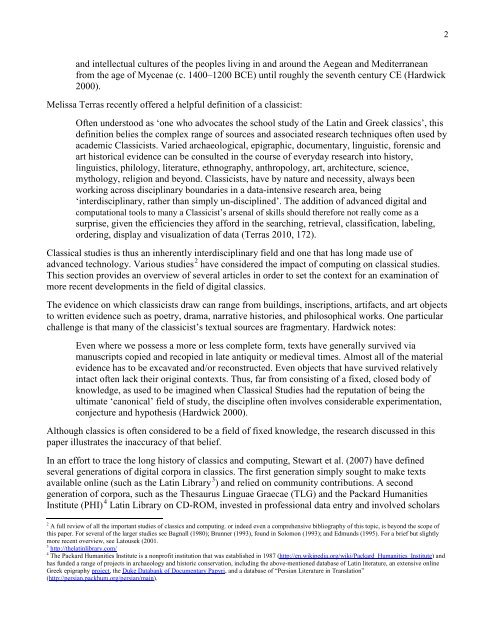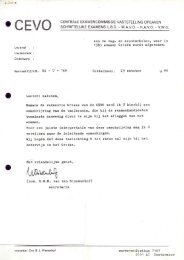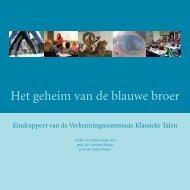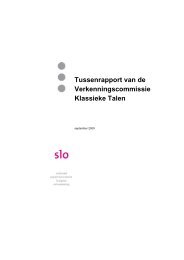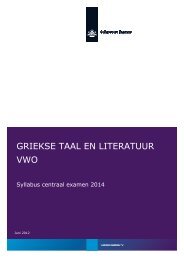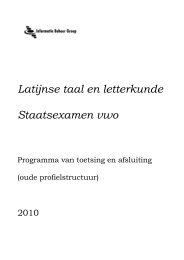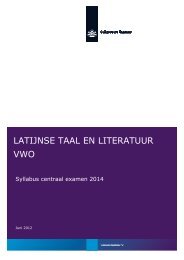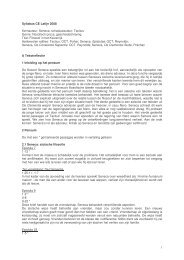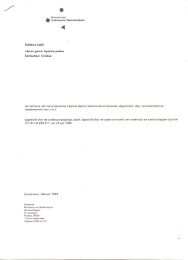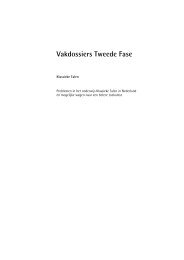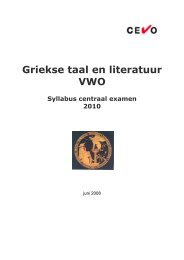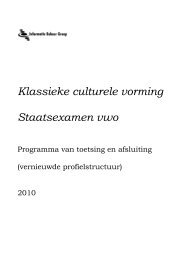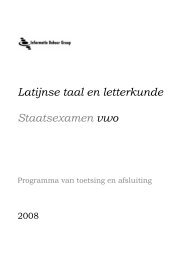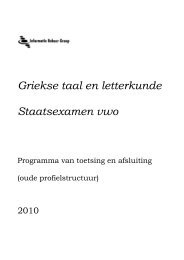Rome Wasn't Digitized in a Day - Council on Library and Information ...
Rome Wasn't Digitized in a Day - Council on Library and Information ...
Rome Wasn't Digitized in a Day - Council on Library and Information ...
Create successful ePaper yourself
Turn your PDF publications into a flip-book with our unique Google optimized e-Paper software.
2<br />
<strong>and</strong> <str<strong>on</strong>g>in</str<strong>on</strong>g>tellectual cultures of the peoples liv<str<strong>on</strong>g>in</str<strong>on</strong>g>g <str<strong>on</strong>g>in</str<strong>on</strong>g> <strong>and</strong> around the Aegean <strong>and</strong> Mediterranean<br />
from the age of Mycenae (c. 1400–1200 BCE) until roughly the seventh century CE (Hardwick<br />
2000).<br />
Melissa Terras recently offered a helpful def<str<strong>on</strong>g>in</str<strong>on</strong>g>iti<strong>on</strong> of a classicist:<br />
Often understood as ‘<strong>on</strong>e who advocates the school study of the Lat<str<strong>on</strong>g>in</str<strong>on</strong>g> <strong>and</strong> Greek classics’, this<br />
def<str<strong>on</strong>g>in</str<strong>on</strong>g>iti<strong>on</strong> belies the complex range of sources <strong>and</strong> associated research techniques often used by<br />
academic Classicists. Varied archaeological, epigraphic, documentary, l<str<strong>on</strong>g>in</str<strong>on</strong>g>guistic, forensic <strong>and</strong><br />
art historical evidence can be c<strong>on</strong>sulted <str<strong>on</strong>g>in</str<strong>on</strong>g> the course of everyday research <str<strong>on</strong>g>in</str<strong>on</strong>g>to history,<br />
l<str<strong>on</strong>g>in</str<strong>on</strong>g>guistics, philology, literature, ethnography, anthropology, art, architecture, science,<br />
mythology, religi<strong>on</strong> <strong>and</strong> bey<strong>on</strong>d. Classicists, have by nature <strong>and</strong> necessity, always been<br />
work<str<strong>on</strong>g>in</str<strong>on</strong>g>g across discipl<str<strong>on</strong>g>in</str<strong>on</strong>g>ary boundaries <str<strong>on</strong>g>in</str<strong>on</strong>g> a data-<str<strong>on</strong>g>in</str<strong>on</strong>g>tensive research area, be<str<strong>on</strong>g>in</str<strong>on</strong>g>g<br />
‘<str<strong>on</strong>g>in</str<strong>on</strong>g>terdiscipl<str<strong>on</strong>g>in</str<strong>on</strong>g>ary, rather than simply un-discipl<str<strong>on</strong>g>in</str<strong>on</strong>g>ed’. The additi<strong>on</strong> of advanced digital <strong>and</strong><br />
computati<strong>on</strong>al tools to many a Classicist’s arsenal of skills should therefore not really come as a<br />
surprise, given the efficiencies they afford <str<strong>on</strong>g>in</str<strong>on</strong>g> the search<str<strong>on</strong>g>in</str<strong>on</strong>g>g, retrieval, classificati<strong>on</strong>, label<str<strong>on</strong>g>in</str<strong>on</strong>g>g,<br />
order<str<strong>on</strong>g>in</str<strong>on</strong>g>g, display <strong>and</strong> visualizati<strong>on</strong> of data (Terras 2010, 172).<br />
Classical studies is thus an <str<strong>on</strong>g>in</str<strong>on</strong>g>herently <str<strong>on</strong>g>in</str<strong>on</strong>g>terdiscipl<str<strong>on</strong>g>in</str<strong>on</strong>g>ary field <strong>and</strong> <strong>on</strong>e that has l<strong>on</strong>g made use of<br />
advanced technology. Various studies 2 have c<strong>on</strong>sidered the impact of comput<str<strong>on</strong>g>in</str<strong>on</strong>g>g <strong>on</strong> classical studies.<br />
This secti<strong>on</strong> provides an overview of several articles <str<strong>on</strong>g>in</str<strong>on</strong>g> order to set the c<strong>on</strong>text for an exam<str<strong>on</strong>g>in</str<strong>on</strong>g>ati<strong>on</strong> of<br />
more recent developments <str<strong>on</strong>g>in</str<strong>on</strong>g> the field of digital classics.<br />
The evidence <strong>on</strong> which classicists draw can range from build<str<strong>on</strong>g>in</str<strong>on</strong>g>gs, <str<strong>on</strong>g>in</str<strong>on</strong>g>scripti<strong>on</strong>s, artifacts, <strong>and</strong> art objects<br />
to written evidence such as poetry, drama, narrative histories, <strong>and</strong> philosophical works. One particular<br />
challenge is that many of the classicist’s textual sources are fragmentary. Hardwick notes:<br />
Even where we possess a more or less complete form, texts have generally survived via<br />
manuscripts copied <strong>and</strong> recopied <str<strong>on</strong>g>in</str<strong>on</strong>g> late antiquity or medieval times. Almost all of the material<br />
evidence has to be excavated <strong>and</strong>/or rec<strong>on</strong>structed. Even objects that have survived relatively<br />
<str<strong>on</strong>g>in</str<strong>on</strong>g>tact often lack their orig<str<strong>on</strong>g>in</str<strong>on</strong>g>al c<strong>on</strong>texts. Thus, far from c<strong>on</strong>sist<str<strong>on</strong>g>in</str<strong>on</strong>g>g of a fixed, closed body of<br />
knowledge, as used to be imag<str<strong>on</strong>g>in</str<strong>on</strong>g>ed when Classical Studies had the reputati<strong>on</strong> of be<str<strong>on</strong>g>in</str<strong>on</strong>g>g the<br />
ultimate ‘can<strong>on</strong>ical’ field of study, the discipl<str<strong>on</strong>g>in</str<strong>on</strong>g>e often <str<strong>on</strong>g>in</str<strong>on</strong>g>volves c<strong>on</strong>siderable experimentati<strong>on</strong>,<br />
c<strong>on</strong>jecture <strong>and</strong> hypothesis (Hardwick 2000).<br />
Although classics is often c<strong>on</strong>sidered to be a field of fixed knowledge, the research discussed <str<strong>on</strong>g>in</str<strong>on</strong>g> this<br />
paper illustrates the <str<strong>on</strong>g>in</str<strong>on</strong>g>accuracy of that belief.<br />
In an effort to trace the l<strong>on</strong>g history of classics <strong>and</strong> comput<str<strong>on</strong>g>in</str<strong>on</strong>g>g, Stewart et al. (2007) have def<str<strong>on</strong>g>in</str<strong>on</strong>g>ed<br />
several generati<strong>on</strong>s of digital corpora <str<strong>on</strong>g>in</str<strong>on</strong>g> classics. The first generati<strong>on</strong> simply sought to make texts<br />
available <strong>on</strong>l<str<strong>on</strong>g>in</str<strong>on</strong>g>e (such as the Lat<str<strong>on</strong>g>in</str<strong>on</strong>g> <strong>Library</strong> 3 ) <strong>and</strong> relied <strong>on</strong> community c<strong>on</strong>tributi<strong>on</strong>s. A sec<strong>on</strong>d<br />
generati<strong>on</strong> of corpora, such as the Thesaurus L<str<strong>on</strong>g>in</str<strong>on</strong>g>guae Graecae (TLG) <strong>and</strong> the Packard Humanities<br />
Institute (PHI) 4 Lat<str<strong>on</strong>g>in</str<strong>on</strong>g> <strong>Library</strong> <strong>on</strong> CD-ROM, <str<strong>on</strong>g>in</str<strong>on</strong>g>vested <str<strong>on</strong>g>in</str<strong>on</strong>g> professi<strong>on</strong>al data entry <strong>and</strong> <str<strong>on</strong>g>in</str<strong>on</strong>g>volved scholars<br />
2 A full review of all the important studies of classics <strong>and</strong> comput<str<strong>on</strong>g>in</str<strong>on</strong>g>g. or <str<strong>on</strong>g>in</str<strong>on</strong>g>deed even a comprehensive bibliography of this topic, is bey<strong>on</strong>d the scope of<br />
this paper. For several of the larger studies see Bagnall (1980); Brunner (1993), found <str<strong>on</strong>g>in</str<strong>on</strong>g> Solom<strong>on</strong> (1993); <strong>and</strong> Edmunds (1995). For a brief but slightly<br />
more recent overview, see Latousek (2001.<br />
3 http://thelat<str<strong>on</strong>g>in</str<strong>on</strong>g>library.com/<br />
4 The Packard Humanities Institute is a n<strong>on</strong>profit <str<strong>on</strong>g>in</str<strong>on</strong>g>stituti<strong>on</strong> that was established <str<strong>on</strong>g>in</str<strong>on</strong>g> 1987 (http://en.wikipedia.org/wiki/Packard_Humanities_Institute) <strong>and</strong><br />
has funded a range of projects <str<strong>on</strong>g>in</str<strong>on</strong>g> archaeology <strong>and</strong> historic c<strong>on</strong>servati<strong>on</strong>, <str<strong>on</strong>g>in</str<strong>on</strong>g>clud<str<strong>on</strong>g>in</str<strong>on</strong>g>g the above-menti<strong>on</strong>ed database of Lat<str<strong>on</strong>g>in</str<strong>on</strong>g> literature, an extensive <strong>on</strong>l<str<strong>on</strong>g>in</str<strong>on</strong>g>e<br />
Greek epigraphy project, the Duke Databank of Documentary Papyri, <strong>and</strong> a database of “Persian Literature <str<strong>on</strong>g>in</str<strong>on</strong>g> Translati<strong>on</strong>”<br />
(http://persian.packhum.org/persian/ma<str<strong>on</strong>g>in</str<strong>on</strong>g>).


